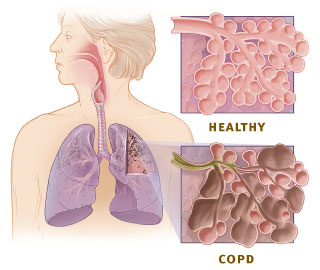 WHO estimates that 210 million people have COPD worldwide. COPD is the 4th leading cause of death in the world, but by 2030 it is expected to be the 3rd, behind CAD and stroke (http://bit.ly/X5nje). COPD mortality is inversely correlated to the forced expiratory volume (FEV1) in 1 second (http://bit.ly/ZYIR7).
WHO estimates that 210 million people have COPD worldwide. COPD is the 4th leading cause of death in the world, but by 2030 it is expected to be the 3rd, behind CAD and stroke (http://bit.ly/X5nje). COPD mortality is inversely correlated to the forced expiratory volume (FEV1) in 1 second (http://bit.ly/ZYIR7).Here are the key recommendations from the recently published Guidelines for management of stable chronic obstructive pulmonary disease (COPD):
1. Spirometry should be obtained to diagnose airflow obstruction in patients with respiratory symptoms. Spirometry should not be used to screen for airflow obstruction in individuals without respiratory symptoms.
2. For stable COPD patients with respiratory symptoms and FEV1 between 60% and 80% predicted, treatment with inhaled bronchodilators may be used.
3. For stable COPD patients with respiratory symptoms and FEV1 <60% predicted, inhaled bronchodilators should be used.
4. Clinicians should prescribe monotherapy using either long-acting inhaled anticholinergics (LAMA) or long-acting inhaled β-agonists (LABA) for symptomatic patients with COPD and FEV1 <60% predicted.
5. Clinicians may administer combination inhaled therapies (long-acting inhaled anticholinergics, long-acting inhaled β-agonists, or inhaled corticosteroids, LABA/ICS) for symptomatic patients with stable COPD and FEV1<60% predicted.
6. Clinicians should prescribe pulmonary rehabilitation for symptomatic patients with an FEV1 <50% predicted. Clinicians may consider pulmonary rehabilitation for symptomatic or exercise-limited patients with an FEV1 >50% predicted.
7. Clinicians should prescribe continuous oxygen therapy in patients with COPD who have severe resting hypoxemia (PaO2 ≤55 mm Hg or SpO2 ≤88%).
References:
Diagnosis and Management of Stable Chronic Obstructive Pulmonary Disease: A Clinical Practice Guideline Update from the American College of Physicians, American College of Chest Physicians, American Thoracic Society, and European Respiratory Society. ACP, 08/2011. Annals of Int Medicine, 2011.
Image source: Enlarged view of lung tissue showing the difference between healthy lung and COPD, Wikipedia, public domain.
7. Clinicians should prescribe continuous oxygen therapy in patients with COPD who have severe resting hypoxemia (PaO2 ≤55 mm Hg or SpO2 ≤88%).
References:
Diagnosis and Management of Stable Chronic Obstructive Pulmonary Disease: A Clinical Practice Guideline Update from the American College of Physicians, American College of Chest Physicians, American Thoracic Society, and European Respiratory Society. ACP, 08/2011. Annals of Int Medicine, 2011.
Image source: Enlarged view of lung tissue showing the difference between healthy lung and COPD, Wikipedia, public domain.